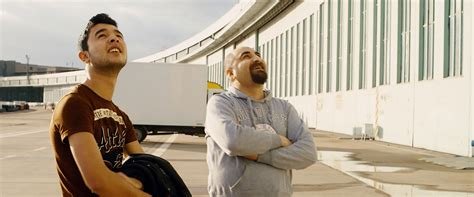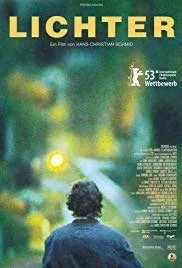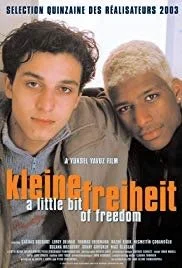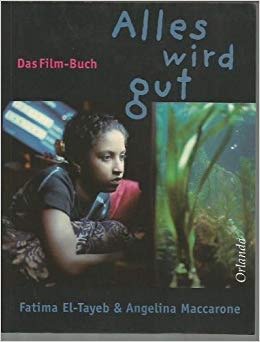- Activism
- Animation
- Asylum
- Austria
- Berlin
- Black Germans
- Childhood
- Cologne
- Colonialism
- Comedy
- DDR
- Documentary
- East/West Germany
- Environment
- Food
- Hamburg
- Health
- Holocaust
- Immigration
- Intergenerational Families
- Jewish
- Judicial system
- Lesbian/Gay
- Lübeck
- Munich
- National Socialism
- Politics
- Pomerania
- Racism
- Religion
- Sexism
- Short films
- Stuttgart
- Switzerland
- Twins
- Weimar Republic
Zentralflughafen THF | Central Airport
Berlin's Tempelhof Airport was opened in 1923 and, under Adolf Hitler, extended to become the world's largest airport which was finally closed in 2008. But even today Tempelhof Airport remains a place of arrivals and departures being used simultaneously as a refugee shelter and a leisure park for the inhabitants of Berlin. A historically un
Otomo
On Aug. 9, 1989, as a black man was stopped on a bridge in Stuttgart for questioning, he knifed two officers to death and wounded three others before being shot dead himself. This man's name was Frederic Otomo. At about 6:15 that morning, he had been confronted on a subway train by a ticket inspector, who told him he had to get off at the next stop. The inspector got aggressive with Otomo, who head-butted him and fled from the train, setting up the manhunt that ended on the bridge.
Those facts are known. What happened between the two incidents is unknown, and inspires this film by Frieder Schlaich, who tries to imagine what went through Otomo's mind between the two confrontations. Along the way, Schlaich portrays a society in which some are racists who act cruelly toward the black man, and others, even strangers, go out of their way to help him.
Lichter
This movie reflects on the situation around the border between Poland and Germany. The fate of many single characters creates a picture of life in this region: Some Ukrainians want to cross the border illegally to get into Germany, a company wants to build a new factory, a Polish taxi driver desperately needs money to buy his daughter a communion dress, and so on.
Willkommen bei den Hartmanns
A well-off Munich family offers boarding to a refugee. Diallo from Nigeria soon makes friends among the family members, but they are tested when they have to face racism, bureaucracy and terror suspicions because of him.
Harvest of Empire
Film based on the ground-breaking book by award-winning journalist and Democracy Now! co-host Juan González. Featuring real life stories and rare archival footage, the film examines the political events, social conditions, and U.S. government actions that led millions of Latino families to leave their homelands in an unprecedented wave of migration over the past six decades. At a time of heated and divisive debate over federal immigration policy, producers Eduardo López and Wendy Thompson-Marquez felt it was important to offer a rare and powerful glimpse into the enormous sacrifices and rarely-noted triumphs of the millions of Latino immigrants who are transforming the cultural and economic landscape of the nation.
kleine freiheit
Kleine Freiheit is a 2003 film about the friendship (and later relationship) between two teenage boys who are illegal immigrants in Germany. The movie was critically well-received, particularly because of its accurate depiction of the Turkish–Kurdish conflict and the acting prowess of the nonprofessional actors. Cagdas Bozkurt won an acting prize at the Ankara film festival, while the movie won a viewers’ choice award in Istanbul. Kleine Freiheit, the German title of the movie, is a wordplay on Große Freiheit (Great Freedom), the rather famous name of a street in the red light St. Pauli district, in Hamburg, where the plot is set.
Evet, ich will!
Evet, ich will is a refreshing Turkish–German comedy about four cross-cultural couples in Berlin. All are challenged to grapple with political, cultural, and religious differences in the name of love.
Alles wird gut
This savvy and sexy film opens with its heroine, Nabou, a black lesbian living in Germany, being unceremoniously dumped by her lover Katja, a self-centered, blue-haired, white punker. Nabou takes a job cleaning Kim’s apartment, the straight black woman who lives in the same building just below Katja, ostensibly to stay as close as possible to her ex. Meanwhile Kim, with her own melodrama to deal with, feels overworked and underappreciated by her boyfriend, who is also her boss at the ad agency for which she works. While at first cool to and seemingly uninterested in each other, Nabou and Kim’s relationship blossoms over time, even as Katja decides she wants Nabou back and Kim’s boyfriend pops the big marriage question. With its hip soundtrack, overlapping story lines, and satirical take on racism, Everything Will Be Fine is a modern lesbian comedy sure to surprise and please.
Alamanya: Willkommen in Deutschland
Six-year-old Cenk Yılmaz is faced with the question of his identity when he is not voted into either the Turkish or the German soccer team at his German school. As the son of Ali, who is of Turkish origin, and his German wife Gabi, he does not speak Turkish.
At a family celebration, his grandmother Fatma announces that he has recently been naturalized in Germany, and grandfather Hüseyin explains that he has bought a house in his home village in Turkey that he wants to use as a summer residence. In order to renovate it, he decides that the entire family will go there for the holidays.









